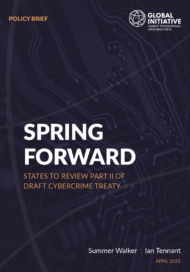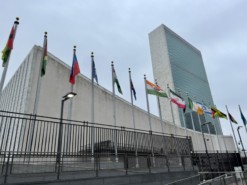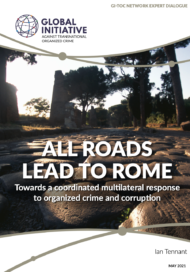Posted on 08 May 2023
As negotiations on the UN treaty advance, there are looming questions for the upcoming zero draft. Lack of consensus on key points continues to define the formative stages.
The UN Ad Hoc Committee negotiating a treaty on Countering the Use of Information and Communications Technologies for Criminal Purposes (‘AHC’) completed its fifth meeting in April, marking the end of deliberations on potential text before a ‘zero draft’ treaty is provided to states in June 2023.
States have finished reviewing the consolidated negotiating document provided by the AHC. The latest session turned to discussions on proposed chapters in the treaty on international cooperation, technical assistance, prevention, the implementation mechanism, final provisions and the preamble. States can now look ahead to debating a full zero draft at the next meeting in August 2023.
However, following the April session, states are still no closer to agreeing on the convention’s key points, so in August delegates will have to consider decisions on key issues – such as the terminology to be used (e.g. ‘cybercrime’ or ‘the use of information and communications technologies for criminal purposes’); the scope of crimes to be criminalized under the treaty; the scope of cooperation; and human rights and data protection safeguards. The content of the zero draft may propose some answers to these sticking points, or, equally, the committee could choose to leave certain items bracketed in the text and thus not decided. The August session could therefore be the moment when decisions are taken to a vote, if consensus is still not reached. But without finality on these points of difference, the AHC’s timeline, which requires the treaty to be adopted in early 2024, will be in doubt and the AHC may have to take steps to mitigate that.
Despite the lack of substantive progress, the fifth session did produce one tangible area of relative consensus on the mechanism that should be used to implement the treaty. Here, states agreed that a ‘Conference of Parties’ model, like the UNTOC and UNCAC, should be adopted, but without negotiating the details thereof.
The Throughline: juxtaposing safeguards and efficiency
As we have seen in our coverage of earlier meetings, two vocal groups have persistently polarized on the issues of how the treaty addresses scope of cooperation, and legal and human rights safeguards. During the fifth session, they continued to espouse two very different visions for the future treaty. The first group – which includes Russia, China, the Africa Group, CARICOM and members of the Arab Group – have proposed a wide scope treaty without restrictions – arguing that specific language on safeguards, privacy rights and human rights will be detrimental to the efficiency of the treaty. Those countries negotiating against rights and safeguards provisions have used the UNTOC and UNCAC as justification, arguing they are not opposed to human rights and data protection, but that the predecessor conventions hardly mention human rights.
The second group – primarily the Western European and Others Group, and Budapest Convention members and observers, such as Japan, the Philippines and several Central and South American states – have called for a limited scope of cooperation with strong safeguards. These states claim safeguards will strengthen cooperation but have different perspectives on data protection clauses and scope of cooperation, including how wide the range of crimes should be for certain activities. However, all call for strong safeguards in the treaty language. Then there are states who straddle both groupings, seeking wide cooperation while simultaneously supportive of the kinds of safeguards referred to above.
The second group had given ground on the scope of cooperation at the fourth session in January, by agreeing that broader cooperation could be granted through the treaty as long as the treaty criminalizes a narrow scope of activities. However, at the fifth session in April a small group of countries emerged as supporters to limit cooperation – a key element in efforts to mitigate the risks inherent in broad cooperation for groups such as journalists, researchers and civil society activists.
These perspectives are the basis of many major ongoing disagreements in the negotiations. For instance, in April, some states questioned the inclusion of human rights language, as well as privacy and data protection, in the preamble, while the other group have argued it is important to retain such detail.
On international cooperation, the first group asked for removal of references to safeguards that cross-reference the chapeau article on safeguards in the law enforcement and procedural measures chapter (Article 42), and questioned the need for Article 5 (human rights in the general provisions chapter). The second group, by contrast, have suggested more robust language and additions, or argued to retain existing references.
Some differences within the second group were evident during the fifth session. In particular, the US objected to the EU’s data protection proposals, which they see as unworkable under the American criminal justice system. The EU’s proposals are based on its own high levels of protection provided for in EU regulations, while the US was clear that they are not prepared to adopt this level of privacy safeguards – particularly with regard to their own requirements such as the need to retain data on criminal proceedings for the purposes of future appeal hearings. At the same time, others, such as Australia and the UK, voiced more nuanced concern over the EU proposals stating that this should not be a data protection treaty, as this would be difficult to agree upon.
On technical assistance, tempering risks by including relevant safeguards was debated along the now familiar dividing lines. The first group questioned the inclusion of language on transparency and accountability, which they believe will hinder access to assistance. Many states in the first group also questioned or rejected the inclusion of civil society in technical assistance efforts, a position that would preclude large pools of expertise and run counter to how existing capacity-building efforts have long operated.
It is ironic how states have formed the most consensus around how a treaty that lacks consensus should be implemented. This is largely due to efforts by the Swiss Ambassador in Vienna and the Nigerian Vice Chair of the AHC to garner agreement on the options laid out in the negotiating document.
The result consists of applying the UNTOC and UNCAC-style Conference of Parties to this proposed treaty. With regard to the more thorny elements of implementation mechanisms – including civil society access, funding and detailed modalities – states seem in favour of negotiating this later, which would risk the same kinds of delays and restricted civil society access that have dogged the UNTOC and UNCAC models.
On final provisions, another faultline emerged in the discussions, with Western countries placing a much higher number of signatories (70) before ‘entry into force’ of the treaty than the Russian and other aligned delegations (proposing 30 signatories). Some states attempted to find a middle ground. Thailand, for example, voiced support for 40 to 50 states, emphasizing the importance of rapid application, as Thailand is not party to any existing agreement.
An unfeasible timeline?
A draft convention will be produced in June, which states will discuss at the August session in New York. The current plan is for a final session to adopt the treaty at the beginning of 2024. The lack of leeway on fundamental issues, however, does not appear to indicate that any big concessions by the two main ‘polar’ groups are in the offing, and indeed the AHC requires all efforts towards consensus to be exhausted before invoking the two-thirds voting mechanism. Potentially, inevitable voting could therefore be delayed from August until January to allow for more progress on consensus. However, states may decide that the timeframe is too short and in August may update or extend the workplan based on the current lack of progress on key divisive issues.
There remains a fundamental difficulty in negotiating this treaty, when no positive exists at the UN. This is compounded by resistance from countries narrowly aiming to enhance law enforcement capabilities, viewing safeguards as obstacles to achieving their objectives – whether practical and benign, or aimed at control and suppressing dissent.
It remains to be seen whether the AHC can square this circle, and in August we will find out how far states are willing to go in order to try. If tangible progress is not made, we could see the process lose momentum on its trajectory to 2024, or even begin to unravel.
This article is supported by the Swiss Permanent Mission to the United Nations in Vienna. The views expressed do not necessarily reflect the views of the Swiss government.



